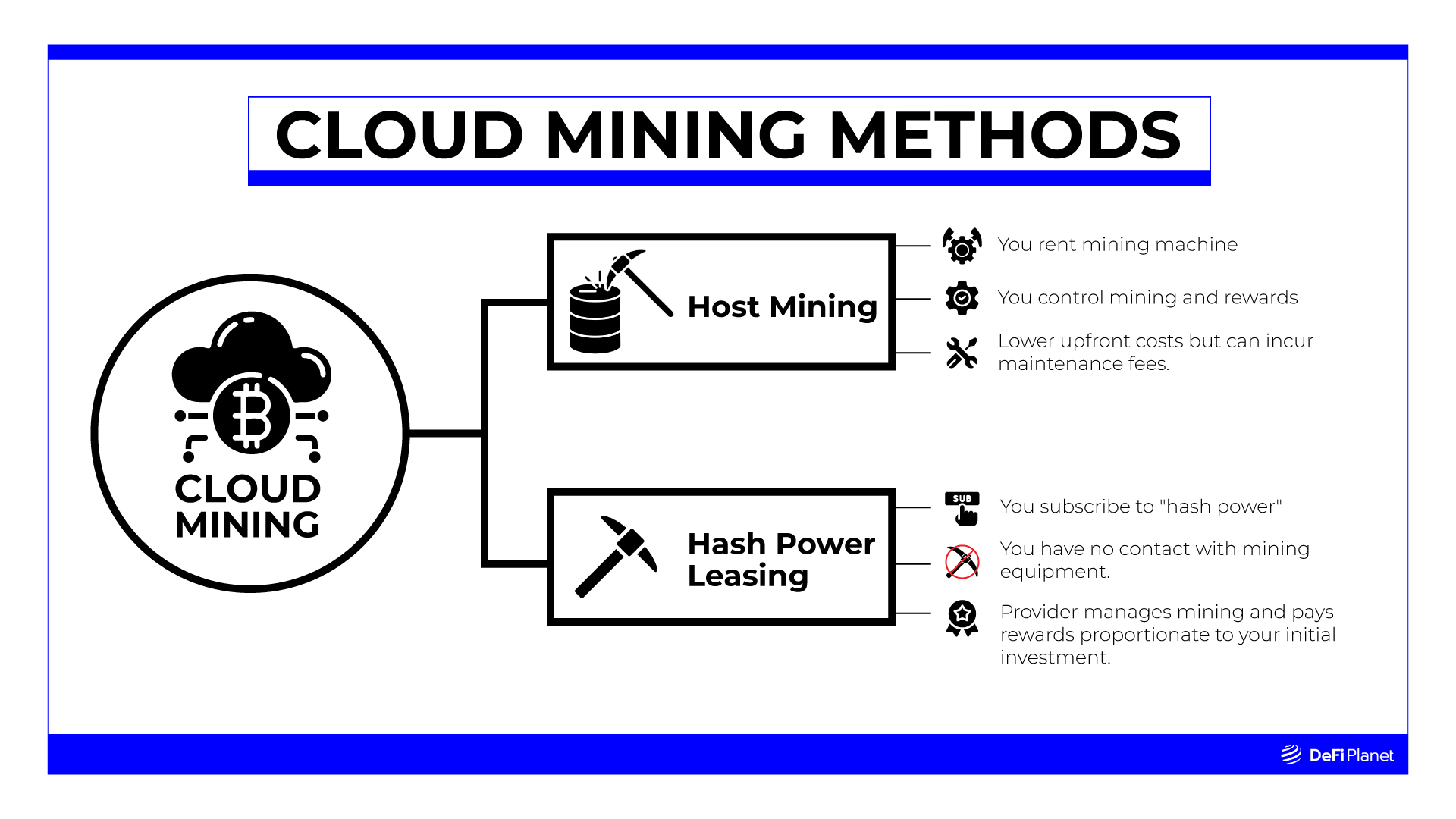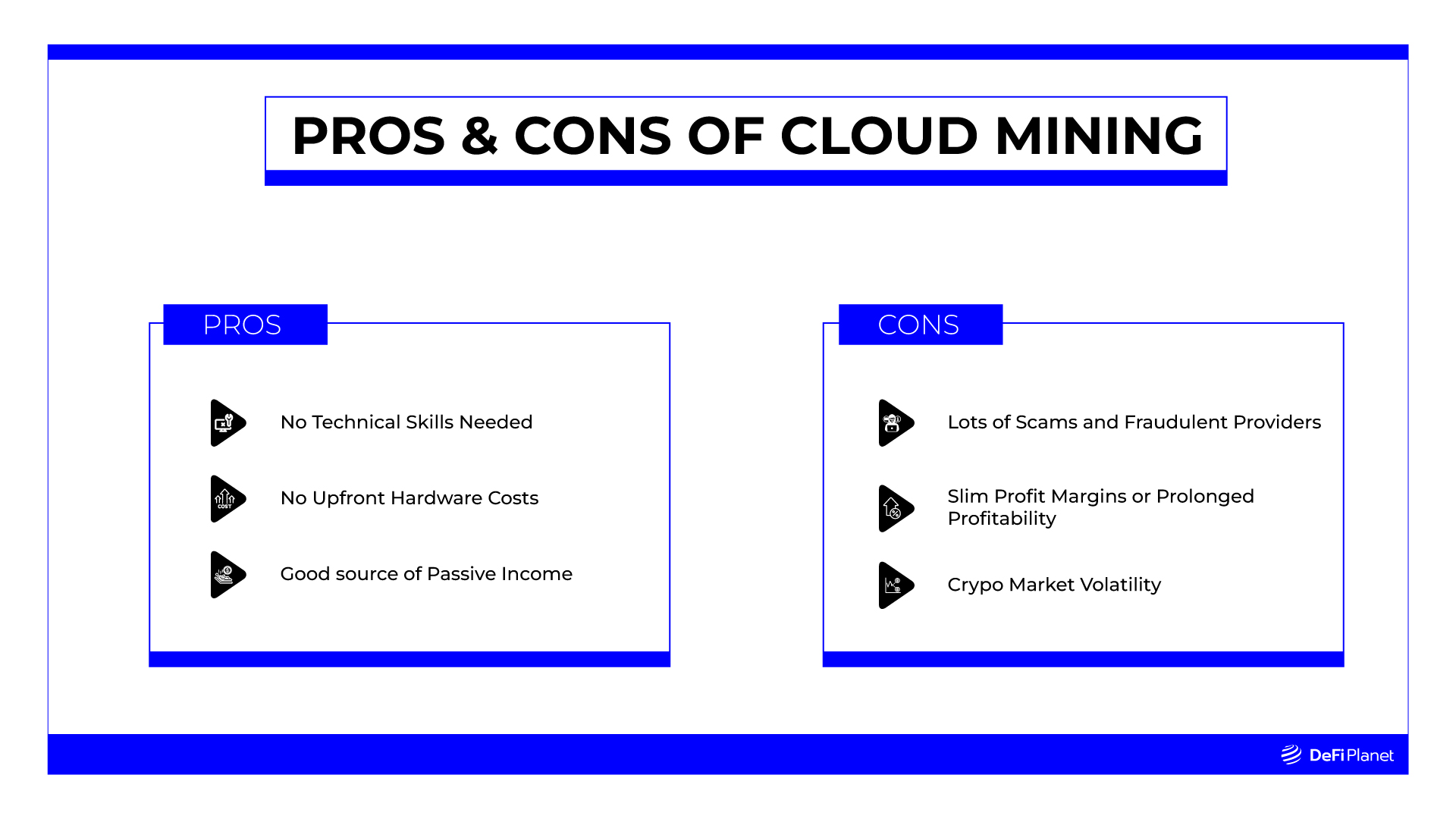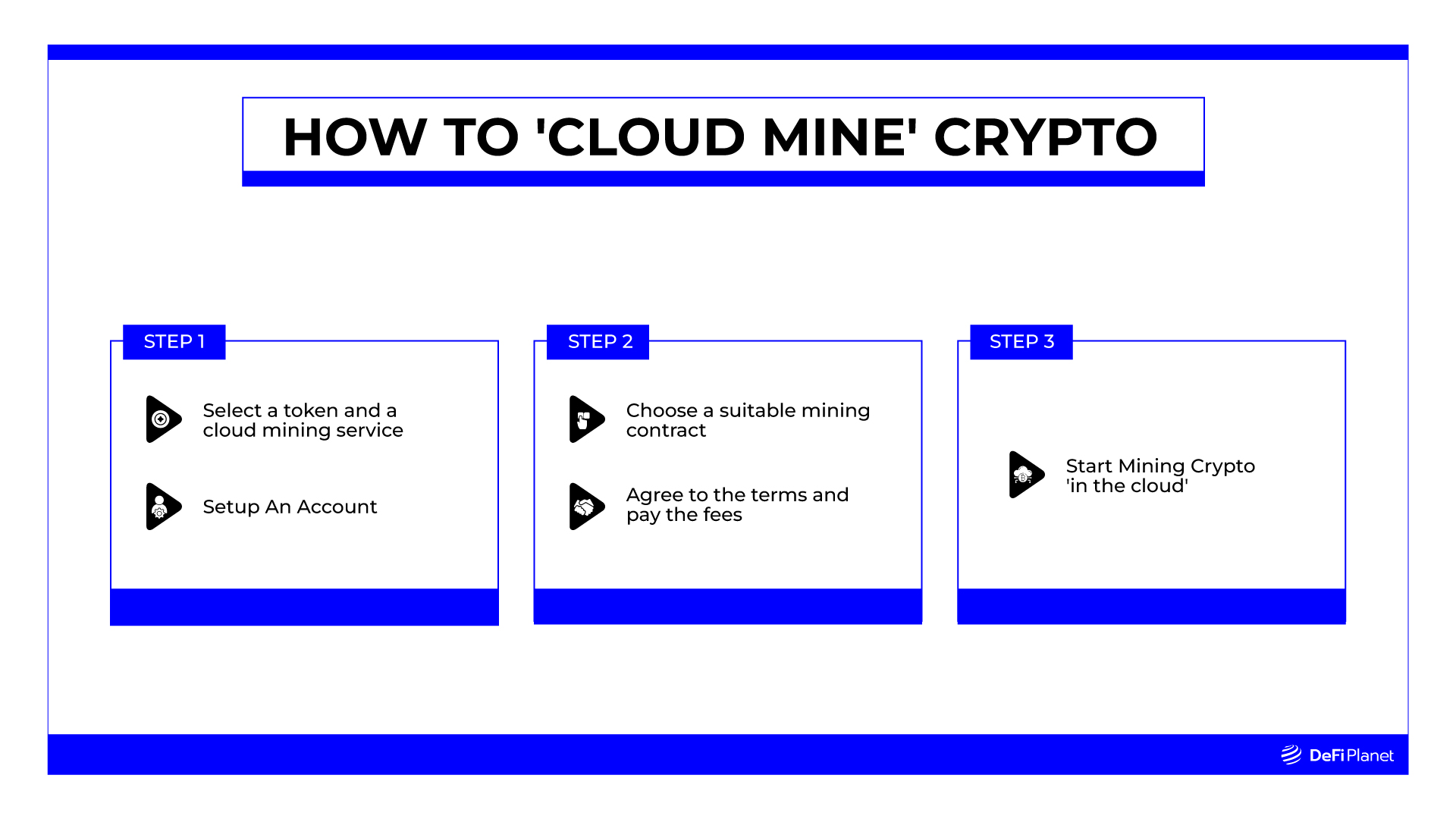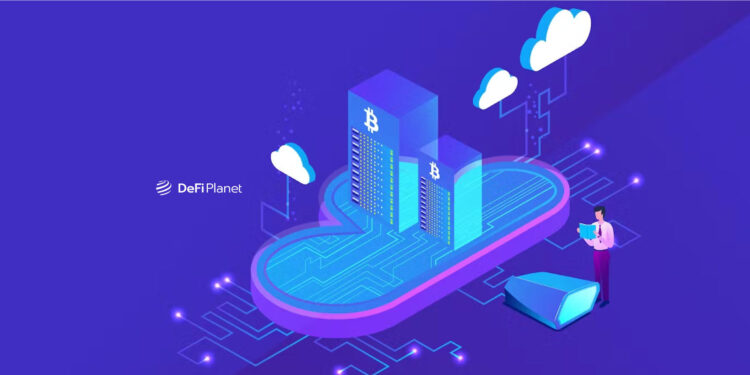Last updated on June 20th, 2024 at 02:09 pm
In the last ten years, cryptocurrency mining has been something reserved for a select class of people in the cryptocurrency industry. This is primarily due to the substantial computational power needed, which in turn requires expensive and sophisticated equipment. Furthermore, cryptocurrency mining demands copious amounts of electricity and specialized technical know-how.
Initially, this setup appeared to maintain a high standard for the mining process, but it quickly evolved into a problem. It essentially became the antithesis of what crypto is all about–decentralization and accessibility.
In a bid to address this problem, cloud mining emerged as a better way to mine cryptocurrencies, especially for people who are not tech-savvy or don’t have the financial resources to purchase mining hardware.
So, What Is Cloud Mining in Crypto?
Cloud mining simply introduces the very familiar concept of “cloud computing” to the crypto-mining process. It allows potential miners to mine crypto “in the cloud;” that is, without owning the sophisticated hardware required. This eliminates the high cost of purchasing the equipment and the need for the technical know-how to operate them.
Mining crypto becomes as easy as typing “docs.google.com” when you need a word processor to type a letter or memo.
However, this doesn’t completely eliminate the need for the equipment; it simply means that as an “ordinary miner,” you no longer need to concern yourself with it. Specialized companies shoulder the costs of purchasing, operating, and maintaining this equipment. These companies maintain expansive facilities housing the specialized equipment essential for cryptocurrency mining.
How Does Cloud Mining Work in Crypto?
From the previous explanation, we can discern that cloud mining involves just two parties: the “cloud miner” and the “service provider.”
To “cloud mine a crypto token”, a potential miner simply needs to enter an agreement with the service provider. Once the miner agrees to a contract specifying the duration of mining and the payment method, the provider grants access to the cloud mining equipment to initiate the process. However, the manner in which this “access” is provided varies.
Currently, a cloud mining service provider grants customers access to crypto mining infrastructure in two main ways. They either offer full physical access to the equipment (host mining) or assure users of a share of the mined tokens proportional to the amount of “hash power” they paid for.
Host Mining
In host mining, the cloud miner rents a mining machine(s) from a service provider. The miner doesn’t have to bear the expenses of purchasing the equipment, as well as costs like electricity and rig expenses that one would typically incur when starting their mining operation. The only expenses the miner has to bear are rent and maintenance costs.
The cost of renting mining equipment typically depends on the machine’s power (measured in Gh/s or Th/s). It may also encompass a setup fee, and occasionally, the provider may charge for maintenance, removing that concern from the miner’s shoulders. If adjustments or tweaks to the machine, such as rig hash power and strength, are needed, all that’s required is to contact the provider.
The best part of host mining is the complete control over rewards. The provider does nothing in the mining process but provide the equipment, so they don’t have a say in whatever one does with the crypto mined.
Hash Power Leasing
This approach to cloud mining is akin to the investment strategy of purchasing shares in a company. You receive a share of the profits, in this case, the mined tokens, without concern for the company’s operations or incurring any expenses.
Rather than renting a rig on a mining farm, hash power leasing allows users to rent a portion of the service provider’s farm’s hash power – a metric measuring the capabilities of cryptocurrency mining machines, specifically their speed.
Similar to host mining, this cloud mining method minimizes overhead expenses. Users only pay a subscription fee, and since there’s no rig to maintain, setup and maintenance costs are nonexistent.
In this method, the service provider manages the rewards. It is calculated based on the percentage of hash power leased.
Your agreement with the service provider determines the frequency at which you receive them. However, some miners receive payments as frequently as daily.
Why You Should Try Cloud Mining
Cloud mining is the perfect way to get started if you are interested in crypto mining, especially if you lack the resources or technical expertise to establish a mining operation. Here are the key reasons why:
No Technical Skills Needed
Cloud mining doesn’t demand advanced technical skills or specialized knowledge to begin. You can always rely on the service providers to handle all the complex aspects. They already handle the hardware setup, maintenance, and software configurations.
No Upfront Hardware Costs
Regular cryptocurrency mining requires expensive upfront investments in mining hardware, which can quickly become outdated due to technology advancements. Miners also have to bear the financial burden of maintaining them.
However, cloud mining eliminates the need for significant upfront hardware expenses and ongoing maintenance costs. You would also not worry about equipment becoming outdated.
Source of Passive Income
Cloud mining is a way to earn passive income with cryptocurrencies, especially through hash power leasing. You practically don’t have to worry about doing a thing except “buying the hash power.”
When you buy a cloud mining contract, the responsibility for mining shifts to the cloud mining company. As the cloud mining operation continues, you will keep receiving a steady stream of cryptocurrency rewards.
Some Drawbacks of Cloud Mining
Despite its advantages, cloud mining carries substantial risks and drawbacks. Without careful consideration, these issues can turn the process into a challenging endeavour. Therefore, it’s important to approach cloud mining with a clear understanding of its nuances and potential challenges.
Scams and Fraud
The cloud mining space is rife with scams and fraudulent activities. Many service providers make deceptive promises and disappear once they accumulate enough users. Due to the difficulty of verifying these providers’ claims, many individuals fall victim to malicious actors and lose their investments.
Thus, if you are going into cloud mining, conduct thorough research and verify the legitimacy of your chosen service provider before investing your funds.
Slim Profit Margins or Prolonged Profitability
Despite its convenience, cloud mining may yield lower profits due to the fees charged by service providers. Their desire to make a profit often influences the fees they charge. Also, users’ potential profits may be impacted when service providers face financial, legal, or technical issues. The providers are often eager to recoup their investment in mining infrastructure, so users often bear the brunt of these issues. So, it’s possible to see lower returns from cloud mining compared to traditional mining with self-owned own hardware.
The hash power leasing method, in particular, may take a considerable amount of time to become profitable. You may need to commit to a long-term agreement before realizing reasonable returns on your investment.
Some service providers may not fully disclose their fees, mining methods, or critical details, further complicating the assessment of profit potential and risk levels. Thus, carefully evaluate the trustworthiness of your chosen cloud mining provider before investing.
Market Volatility
The cryptocurrency market is a volatile one; prices change fast. These price swings can directly impact your returns from cloud mining, and if you are not careful, you might lose all your funds. So, remember this when evaluating how profitable cloud mining contracts might be.
How Can You Mine Crypto in the Cloud?
If you are intrigued by the concept of cloud mining crypto and want to know what it entails to get started, this is a general overview of what you need to do. 
Step 1: Choose A Token to Mine and Research Cloud Mining Service Providers for it
The cryptocurrency market offers various tokens, and there are numerous cloud mining service providers to consider. Therefore, your first task is to decide which cryptocurrency you want to mine and find a suitable service provider offering it.
When choosing a cloud mining service provider, make sure to research their credibility and reputation in the industry. You might also consider joining a mining group to increase your chances of identifying a reliable provider.
Currently, bitcoin and Dogecoin have the biggest mining farms–a collective of crypto miners. So, you’re more likely to locate service providers for these tokens more quickly than for others.
Step 2: Register and Choose a suitable mining contract
Once you’ve chosen a cloud mining provider, visit their website, and proceed to register. Provide the necessary details, including your email, username, and a strong, unique password to ensure account security.
Next, browse through the available mining contracts provided by the cloud mining service. These contracts vary in terms of duration, hash power, and cost, so carefully select the one that aligns with your goals and budget.
Depending on your arrangement with the provider, you may need to link your cryptocurrency wallet to your cloud mining account.
Step 3: Start Mining Crypto “in the Cloud.”
After you have settled all the necessary agreements with the service provider and completed all the required processes, the next thing is to activate your chosen contract to begin mining cryptocurrency “in the cloud.”
Best Practices for Cryptocurrency Cloud Mining
Before committing to a cloud mining contract with a service provider, it’s crucial to conduct comprehensive research. Examine the provider’s history, read reviews, and assess its standing within cryptocurrency communities. Generally, providers with a lengthy track record, a positive reputation, and substantial size tend to be more reliable.
Additionally, scrutinize the security measures the cloud mining company uses to safeguard your investments and personal information. Ensure they implement robust security features, such as encryption and multi-factor authentication, to deter hacks and data breaches.
Understand the pricing structure of your cloud mining contract, including potential fees and other costs. Also, consider factors like electricity and equipment maintenance, which are usually included in the contract price.
Protect Your Mining Rewards. One way you can do this is by enabling two-factor authentication (2FA) systems for both your cloud mining account and wallet. However, the most important thing is that you are conscious of how you treat access to the account and wallet.
Stay Updated and Adjust to Market Changes. Given the dynamic nature of the cryptocurrency market, it’s essential to stay abreast of trends and news to optimize your success in cryptocurrency cloud mining. Additionally, stay updated on the regulatory landscape in your region and the regions where the cloud mining company operates. Verfiy that the company complies with all applicable laws, as regulatory shifts can impact your investment.
Lastly, diversify your investments. While cloud mining can be a valuable component of your investment strategy, it’s advisable not to allocate all your resources to it. Instead, incorporate cloud mining into a broader investment plan rather than relying solely on it as your primary income source.
Disclaimer: This article is intended solely for informational purposes and should not be considered trading or investment advice. Nothing herein should be construed as financial, legal, or tax advice. Trading or investing in cryptocurrencies carries a considerable risk of financial loss. Always conduct due diligence.
If you would like to read more articles (news reports, market analyses) like this, visit DeFi Planet and follow us on Twitter, LinkedIn, Facebook, Instagram, and CoinMarketCap Community.
“Take control of your crypto portfolio with MARKETS PRO, DeFi Planet’s suite of analytics tools.”






















